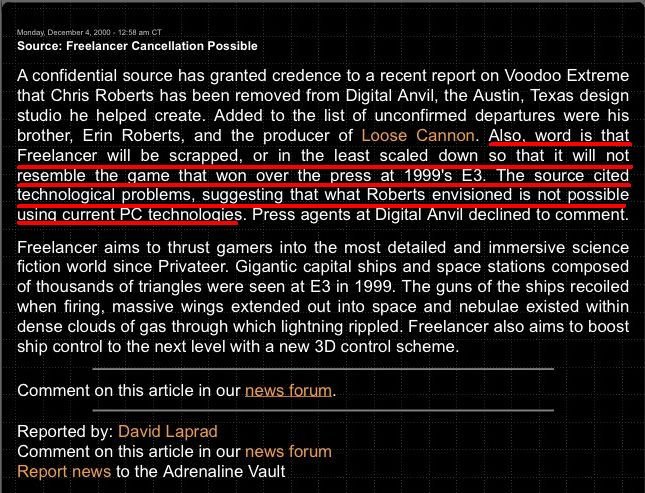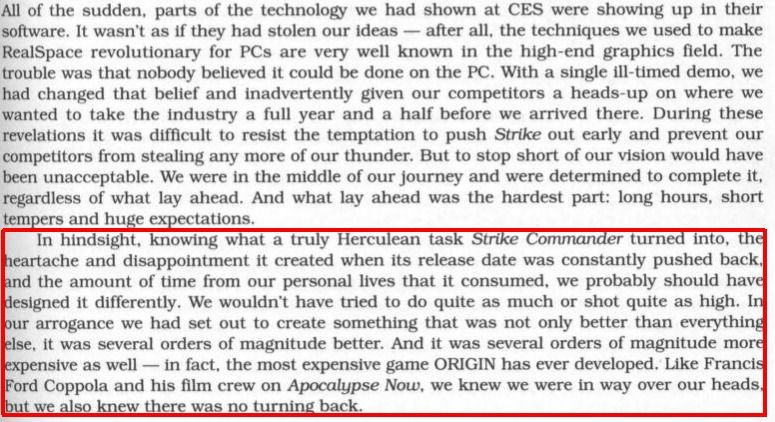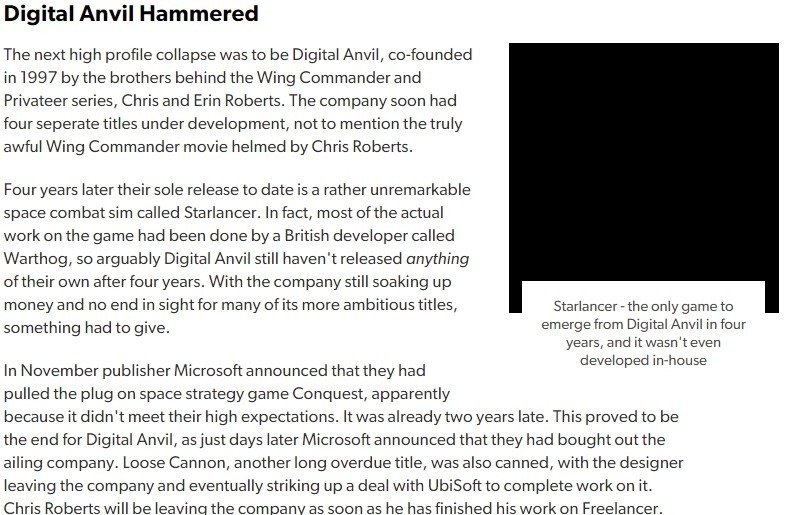
Sunday morning Star Citizen newspaper thread.
Until another (in the works) fiasco unfolds, this will probably be my last take on the fallout from the Forbes article by @MattRyanPerez
It's a trip down memory lane which I'm sure most will find interesting, if not alarming.
Until another (in the works) fiasco unfolds, this will probably be my last take on the fallout from the Forbes article by @MattRyanPerez
It's a trip down memory lane which I'm sure most will find interesting, if not alarming.
First, please get caught up because some of what is in this thread will seem out of context if you're not caught up on the drama.
https://twitter.com/dsmart/status/1124414825755545610?s=20
David Piner @orangekun has been around the scene for some time now. Like others chiming in, his latest article following the Forbes article, got me thinking about a few things. You can read that column below. It's quite the read.
gametruth.com/editorials/the…
gametruth.com/editorials/the…
We all know the story behind Freelancer (Chris Roberts last game) right from when Microsoft bought Digital Anvil in 2000. You can read the original press release below. There will be a quiz later.
bluesnews.com/a/100
bluesnews.com/a/100
This was 3 years after they inked a multi-title publishing deal in 1997
archive.fo/dyxGe
For several weeks prior, there were already rumblings that Microsoft had grown fed-up and frustrated with Chris Roberts, and the only way to save the projects, was to kick him out.
archive.fo/dyxGe
For several weeks prior, there were already rumblings that Microsoft had grown fed-up and frustrated with Chris Roberts, and the only way to save the projects, was to kick him out.
While there have been several stories since 2012 which sought to go back to 2000 in an attempt to retrace the steps, not many were able to give an accurate accounting. In fact, @Kotaku_UK came the closest in their 5-part series from 2016.
kotaku.co.uk/tag/inside-sta…
kotaku.co.uk/tag/inside-sta…
The same week that those rumblings were going on, details were already leaking to various publications; but because this was Chris Roberts, very few were willing to take the risk and go on the record with anything. Those were some dark times in our industry btw
Most of us knew, and we "whispered" about it in forums, emails etc. In a time when devs and publishers had some media people - literally - in their pockets, careers were routinely destroyed or hampered for speaking out against the wrong industry person.
During this time, a little known media outlet, dared to print it. Read that carefully.
web.archive.org/web/2001042315…
web.archive.org/web/2001042315…

Over the years more details were revealed, some on the record, and others off. And it was ALL the SAME theme. After Wing Commander, a herculean team effort, which emboldened Chris to go off on his own, it literally went downhill - consistently.
gamespot.com/articles/games…
gamespot.com/articles/games…
For example, I invite you to read p45 of the Strike Commander manual.
ps. The game flopped btw
archive.org/details/Strike…
ps. The game flopped btw
archive.org/details/Strike…

In 2001, as part of their The Death Of The Celebrity Studio article @eurogamer said this:
eurogamer.net/articles/a_stu…
eurogamer.net/articles/a_stu…

Wing Commander series, a colossal team effort for its time, was Chris Roberts' last successful game. Every - single - game that followed, not only flopped or barely broke even, while leaving publishers and investors holding the bag.
The theme is very simple; and it goes as follows:
1) Start with idea 1.0
2) Get suckers to fund idea 1.0
3) Revise + increase scope to idea 1.1
4) Find more suckers to fund idea 1.1
5) Use idea 1.1 money to build idea 2.0
6) Go bust trying to build idea 1.0
7) Build idea 0.9
1) Start with idea 1.0
2) Get suckers to fund idea 1.0
3) Revise + increase scope to idea 1.1
4) Find more suckers to fund idea 1.1
5) Use idea 1.1 money to build idea 2.0
6) Go bust trying to build idea 1.0
7) Build idea 0.9
From Freelancer, he went directly into a different industry: movies. Where he bombed as well. In a rather spectacular fashion that left him broke and unemployed for long stretches of time. Last time he resurfaced, was with the now defunct Blink Media
https://twitter.com/dsmart/status/953773216878747649
In Oct 2015, following my highly publicized July 2015 blog that shoved me into this fiasco, Ted Beale - who was helping Chris get funding for what later got re-branded as Star Citizen - wrote this article. Read it.
voxday.blogspot.com/2015/10/the-90…
voxday.blogspot.com/2015/10/the-90…
In late 2017 when sources kept telling me that Star Citizen was in dire financial straits, it seem incredulous to me. But these were some high level execs who had no incentive to lie, let alone pass along faulty intel. They were genuinely concerned.
Then word started going around that they were looking for bailout either in the form of a publisher (!) buyout, or an investor infusion of cash.
They got no takers.
Some of those people in the orbit, reached out to me. My response was consistent: Don't give him ANY money.
They got no takers.
Some of those people in the orbit, reached out to me. My response was consistent: Don't give him ANY money.
2017 was the defining year that determined what would happen to the project in 2018. And though I couldn't talk about it, once word leaked that they had found an investor to give them cash, in April 2018 I said this.
https://twitter.com/dsmart/status/981930410673360896
Once word of the serious financial state started leaking (via disclosures to third-parties), in May 2018, I said this.
https://twitter.com/dsmart/status/993979761532854272
Writers will tell you the quickest way to lose your sources, is to breach confidentiality. Since I'm old school and take that sort of thing seriously, I tend to honor it or people won't tell me shit. In an industry where it's hard to tell friend | foe, that currency is priceless
So I sat on it. It was not only the single most explosive story in the Star Citizen fiasco, but literally NOBODY outside of a handful of people, knew about it. A leak could quite easily be traced. And Sandi was already on the warpath from previous leaks.
They [CIG execs] knew that I knew, but didn't know when I was going to blurt it out in a blog. Trust me, the stories about me throughout the studios, are as hilarious as they come. Besides cryptic Tweets, the closest I came, was this Sept 2017 missive
dereksmart.com/forums/reply/5…
dereksmart.com/forums/reply/5…
It wasn't until Dec 20, 2018 that CIG released their financial brochure (not an audited statement) along with the $46M bailout (in the guise of SQ42 marketing).
That was 8 days after I was permitted to leak it after their UK financials went public.
That was 8 days after I was permitted to leak it after their UK financials went public.
https://twitter.com/dsmart/status/1072861528632766464?s=20
The evolution of Star Citizen, from it's 2011 inception, to the 2012 crowd-funding windfall, to the missed 2014 ship date & scope increase, to the 2017 insolvency, and finally to the $46M bailout of 2018, brings the whole farce full circle. Just like past failures.
When I finally got around to writing a blog about the shocking revelation, to be perfectly honest, I simply couldn't believe that it was actually true that 5 yrs after raising $207M between Oct 2012 to Dec 2017, that the project was literally insolvent.
dereksmart.com/2018/12/star-c…
dereksmart.com/2018/12/star-c…
In short, EVERYTHING that Chris had said over the years regarding funding, reserves, planning etc were all literally either flat-out FALSE (shocking) or he really had no clue that he was steering the project into insolvency.
It's easy to think that this could all be beginner mistakes which have plagued most of us during out careers. But when you go back and look at the history, the pattern that emerges is hard to ignore.
Chris Roberts is an incompetent hack.
Chris Roberts is an incompetent hack.
As you look back, it all makes perfect sense that the minute I released that 2015 July Blog, stating clearly why I believed the project was doomed, Chris and his cult minions came after me with vigorous hostile intent.
dereksmart.org/2015/08/star-c…
dereksmart.org/2015/08/star-c…
It's almost as if I was onto something. I mean, it's not as if I haven't spent over three decades building massively complex games and game engines, while know a thing or two about how these things go.
Right now, the Forbes article is all the rage. But remember back in Mar 2015, months before my first blog, when @ChrisBaker1337 wrote this article for Wired? We all just loled and moved on. Here we are, FOUR years later.
wired.com/2015/03/fans-d…
wired.com/2015/03/fans-d…
Thing is, from VentureBeat to CBS, Forbes to Variety, Kotaku to <insert fringe media here>, Vox to Polygon, Chris has LIED to EVERYBODY about this project. I can go back and read every statement he's ever made about this project, and show, with CONCLUSIVE EVIDENCE, that he LIED.
The biggest most telling lie is the one which, since day one, I had said people should pay attention to: BACKER MONEY.
7 yrs after raising $207M in backer money, saddled with debt (which are still on the UK books btw), we find out that end of 2017, the project was insolvent.
7 yrs after raising $207M in backer money, saddled with debt (which are still on the UK books btw), we find out that end of 2017, the project was insolvent.
Make no mistake, even when Forbes writes that they only had $17M left, that's based on the CIG brochure. A fully audited financial statement would have taken into account liabilities & debt which, even going by the UK financials, would have shown negative funds.
With the money ALL GONE, they're basically operating on debt and monthly backer funding. Which is why most of us just laugh when Chris goes out and lies about how the $46M bailout is totally for SQ42 marketing.
They're claiming that SQ42 is going Beta middle of 2020, though literally NOBODY on that team, knows wtf he's even talking about. Yet, backers are to believe that raising $46M in May 2018, is to fund marketing for a game that's NOWHERE near release.
Remember back in May 2017 when I wrote that highly credible sources had told me that SQ42 schedule stretched all the way to 2021? Even as CIG kept telling backers it was literally months away?
dereksmart.com/forums/reply/5…
dereksmart.com/forums/reply/5…
Star Citizen will never - ever - see the light of day as a complete product. And certainly not as an MMO.
SQ42, if ever comes out, will be another Freelancer fiasco, released less than what was promoted/planned, as check-mark to reduce liability.
{end}
SQ42, if ever comes out, will be another Freelancer fiasco, released less than what was promoted/planned, as check-mark to reduce liability.
{end}
@threadreaderapp unroll
• • •
Missing some Tweet in this thread? You can try to
force a refresh



